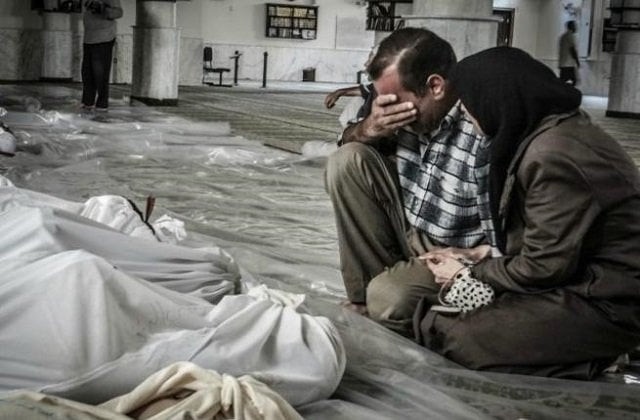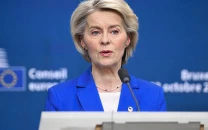Syria's Eastern Ghouta: 18 days under attack
The onslaught has since taken more than 50 per cent of Eastern Ghouta and killed some 850 civilians

Syria has conducted chemical weapons attacks on civilians in Eastern Ghouta. PHOTO: AFP
Planned aid convoy to Syria's Ghouta postponed: Red Cross
The onslaught has since taken more than 50 per cent of Eastern Ghouta and killed some 850 civilians.
Here is a summary of events:
Government forces open a Russian-backed campaign against Eastern Ghouta with more than 260 rockets and intense air raids.
The strikes continue on February 19, when 127 civilians are killed in the highest single day death toll there since 2013, when it was besieged by regime forces.
On February 20 Russian air strikes reportedly target Eastern Ghouta for the first time in three months, hitting the key regional hospital in Arbin.
Six other hospitals are also hit in the bombardments over a 48-hour period, knocking three out of service, according to the United Nations.
On February 21, raids target several areas and aircraft drop barrel bombs -- crude, improvised munitions that cause indiscriminate damage.
The Kremlin denies carrying out air strikes.
UN chief Antonio Guterres calls for an immediate ceasefire, saying the region's 400,000 residents live in "hell on Earth."
The chaos deepens on February 22 as the Syrian regime rains rockets and bombs on the enclave.
At the United Nations, key regime backer Russia presses for a negotiated withdrawal of rebel fighters and their families, like the one that saw the government retake full control of Aleppo in December 2016.
Syria's UN representative Bashar al-Jaafari confirms the comparison, saying: "Yes, Eastern Ghouta will become another Aleppo."
On February 24 the UN Security Council unanimously adopts a resolution demanding a 30-day ceasefire to allow for aid deliveries and medical evacuations.
But new air strikes batter the region the following day. The Syrian Observatory for Human Rights, a Britain-based war monitor, reports Syrian forces are engaged in heavy fighting with rebels, with many dead.
On February 26 the regime carries out more bombings despite the UN truce demand.
Moscow then announces President Vladimir Putin has ordered a daily five-hour "humanitarian pause" from February 27 and the opening of protected corridors to allow people to leave.
Russia says rebels allowed to leave Syria's East Ghouta
Hours after the measure is meant to take effect, the United Nations says fighting has continued, making relief operations impossible.
The Syrian regime again pounds the area on March 4 as President Bashar al-Assad says his forces will continue their push.
"The operation must continue," Assad tells journalists.
On March 5, the UN announces its first aid delivery since the start of the assault. However, the operation is cut short as air strikes batter the enclave.
The Observatory says 18 people suffered breathing difficulties following a strike by a military aircraft in Hammuriyeh, without being able to specify the cause.
On March 6 the regime continues heavy air strikes as its forces make headway in the enclave's farmland.
The regime sends hundreds of Afghan, Palestinian, and Syrian loyalist militiamen to Eastern Ghouta, the Observatory says the next day.
It says heavy air strikes, mostly by Russian warplanes, left at least 45 civilians dead.
Syrian and allied forces have retaken half of the territory rebels held, after retaking two towns as well as farmland, it says.
The offensive has displaced more than 10,000 people in Eastern Ghouta.
The UN human rights chief says that the regime is orchestrating an "apocalypse" in Syria.
The UN Security Council meets behind closed doors to step up pressure on Russia and Syria to abide by the ceasefire.



















COMMENTS
Comments are moderated and generally will be posted if they are on-topic and not abusive.
For more information, please see our Comments FAQ